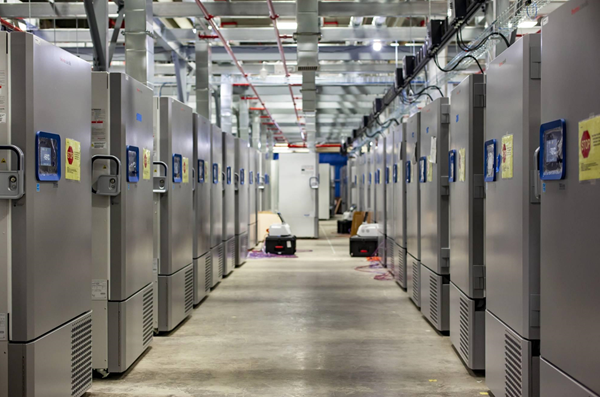A Twitter user has claimed Nigeria does not have the cold chain and distribution system for COVID-19 vaccines.
The user, tweeting via @Anthonia_Egbe, attributed the absence of a cold chain and distribution system to the alleged disqualification of Nigeria by the World Health Organisation (WHO) from global vaccine bid.
- 21-year-old UNILAG undergraduate arrested over murder of Super TV CEO
- Buhari travelling to London for another medical check-up
COVID-19 situation in Nigeria
Data from the Nigeria Centre for Disease Control (NCDC) show that as at June 23, 2021, Nigeria had recorded more than 167,000 cases of COVID-19, out of which over 2,100 deaths were recorded.
The National Primary Health Care Development Agency (NPHCDA) revealed that as at May 29, 2021, almost two million eligible Nigerians have been vaccinated with the first dose, out of which slightly more than 4,000 of them have collected their second doses.
Programme Officer, FCT Immunization Services, Mrs. Salome Tor, decried COVID-19 vaccine apathy in Nigeria.
according to data from Worldometer, as of June 23, 2021, the population of Nigeria was over 211 million. To achieve herd immunity against COVID-19, the Executive Director of the NPHCDA, Faisal Shuaib, said in January that Nigeria would vaccinate 40 per cent of its over 211 million population before the end of 2021, and 70 per cent by the end of 2022.
However, slightly over two million people had been inoculated against the disease as at June 23, 2021. To achieve projected mass inoculation, Nigeria needs huge doses of COVID-19 vaccines with required storage facilities.
But how true is the claim that Nigeria lacks specified storage and distribution system for the vaccines?
Full text of the claim
On February 6, 2021, a Twitter user with the handle, @Anthonia_Egbe, claimed that Nigeria does not have a cold chain and distribution system for COVID-19 vaccine.
The user claimed, “We do not have a cold chain and distribution system in Nigeria. How can we ensure safe storage of the vaccine?”

The claim was a reaction to a media report that the World Health Organisation-led COVAX global initiative did not shortlist Nigeria for the Pfizer vaccines following the country’s inability to meet the standard storage requirement.
On February 6, 2021, the Director of WHO, African Region, Dr Matshidiso Moeti, told journalists that around 320,000 doses of the Pfizer-BioNTech vaccines had been allocated to four African countries – Cape Verde, Rwanda, South Africa and Tunisia.
Tweeting via @Anthonia_Egbe, the Twitter user claimed Nigeria did not have cold chain and distribution system.
How true is the claim?
Specified storage requirements for COVID-19 vaccines. The Pfizer vaccine requires storage at temperatures of around -70 degrees Celsius (-112°F) before being sent to distribution centres in specially designed cool boxes filled with dry ice.
Once out of ultra-low temperature storage, it must be kept at 2C to 8C to remain effective for up to five days.
The manufacturer specified that once thawed or refrigerated under 2-8°C, the vaccine cannot be refrozen.
Pfizer’s “freezer farm” for storing finished COVID-19 vaccines, is located in Kalamazoo, Michigan, from where the vaccines are supplied direct to the point of use. (Jeremy Davidson/Pfizer via AP)
The Moderna vaccine is expected to remain stable at standard refrigerator temperatures of 2° to 8°C (36° to 46°F) for 30 days. Shipping and long-term storage conditions are at standard freezer temperatures of -20°C (-4°F) for six months while mRNA-1273 to be distributed using widely available vaccine delivery and storage infrastructure.
“Once the vaccine is removed from the refrigerator for administration, it can be kept at room temperature conditions for up to 12 hours,” the manufacturer specified.
On the other hand, the AstraZeneca vaccine against COVID-19 has a maximum shelf life of six months stored in a refrigerator between 2 to 8°C.
The manufacturer recommended that once removed from the fridge, the vaccine may be stored between 2 to 25°C for up to six hours and once punctured, the vial must be used within six hours.
Also, the manufacturer specified that the vaccine must not be frozen once punctured. Note that the Oxford-AstraZeneca vaccine uses double-stranded DNA technology unlike the single-stranded mRNA technology employed by Pfizer and Moderna. Hence, it has lower chances of degrading at lower temperatures and can therefore be stored at regular refrigerator temperature.
Does Nigeria have these specified storage specifications for COVID-19 vaccines?
Verification
A visit to Nigeria’s National Strategic Cold Store (NSCS) in Abuja, the nation’s capital, shows that it is the primary storehouse of vaccines in the country, including COVID-19 vaccines. It is the apex layer of the country’s cold chain, which transcends to the Primary Health Care (PHC) Centres at the sub-national level.
NSCS is Nigeria’s apex cold store for vaccine storage, which feeds the each of the six zonal stores across the country, the states and local councils. The NSCS located on the Airport road, Abuja.
On January 19, 2021, the Executive Director of the National Primary Healthcare Development Agency, Dr Faisal Shuaib, took journalists on a tour of the national vaccine cold store in Abuja, where he showcased and confirmed that Nigeria could store COVID-19 vaccines, including the Pfizer vaccine.
Dr Shuaib said the national cold store in Abuja has three ultracold freezers, 11 walk-in cold refrigerators and four walk-in freezer rooms for storage of vaccines.
He further said the store has a combined capacity of 2100 litres and operates at a temperature of -85°C.
A health worker wears protective clothing inside the National Strategic Cold Store in Abuja, Nigeria January 19, 2021.
A 2021 report published on the Journal of Global Health Reports stated that Nigeria has a cold chain capacity of 201m2.
The Director General of the Nigerian Institute of Medical Research (NIMR), Babatunde Salako, said Nigeria has storage facilities for COVID-19 vaccines, but they are not enough.
“Our facilities can hold Pfizer vaccines at -70 degrees but we don’t have enough of such freezers,” Salako said.
A top campaigner for COVID-19 vaccination in Nigeria with over 145,000 followers on Twitter, Sally Suleiman, also said that it is not true that Nigeria does not have a cold chain for COVID-19 vaccine storage.
Suleiman, using her handle, @is_salsu, tweeted that the Federal Government through the National Primary Health Care Development Agency purchased three ultracold chain (UCC) equipment domiciled at the National Strategic Cold Store.
Sally, in a series of promotional tweets for NPHCDA, clarified that the ultracold chains “are capable of storing up to 400,000 doses of vaccines at a temperature of -60 to -80 degree centigrade. The mRNA vaccines can be stored at +2 to +8 degree centigrade at the health facility level for 5 days.”
Suleiman said Nigeria, through the routine immunization delivery system, has enough storage capacity at the National, Zonal, State, LGA, ward and health facility levels for non-ribonucleic acid vaccines, which require storage temperature of +2 to +8 degree centigrade.
This is in addition to Solar Cold Chain Equipment at health facilities to ensure that the maintenance potency of the vaccine.
World Health Organisation (WHO) also said Nigeria is doing better than most African countries in terms of storage of COVID-19 vaccines.
Speaking at a recent joint briefing organised by the National Primary Health Care Development Agency (NPHCDA), WHO and the United Nations Children’s Emergency Fund (UNICEF) in Abuja, the WHO Country Representative, Dr. Kazadi Mulombo, said Nigeria is among the countries that are distributing the most COVID-19 vaccine.
Nigeria has deployed freezers at sub-national levels across the country for storage of COVID-19 vaccines. This reporter visited the COVID-19 vaccination point at the office of the National Union of Journalists (NUJ), Utako, Abuja and discovered that the vaccines were stored in mini coolers.

The United Nations Children’s Fund (UNICEF) is part of the monitoring of COVID-19 rollout and storage in Nigeria. Recently, UNICEF Vaccine Security and Logistics Officer, Haruna Adamu visited the Kwaya Kusar clinic in southern Borno to conduct a physical count of the COVID-19 vaccine stock for quality control.
The Director-General of the National Institute of Pharmaceutical Research and Development (NIPRD), Obi Adigwe, said over the past two to three decades, Nigeria has built capacity in supply chain and logistics which includes cold chain capability.
“I am aware that in every local government area in Nigeria, there is either existing or there was some structure or framework for cold chain storage of products,” he said.
Interestingly, even the WHO debunked the claim that Nigeria has no storage facilities for COVID-19 vaccines.

WHO also refuted claims that Nigeria was disqualified from participating in the COVID-19 vaccine distribution because it lacked COVAX storage facilities.
WHO Representatives in Nigeria, Kazadi Mulombo, said during a press conference that the news of Nigeria disqualification based on lack of COVAX storage facility was not true.
He said Nigeria had the facilities to store even Pfizer vaccines.
Conclusion
The claim that Nigeria does not have a cold chain system for COVID-19 vaccine storage is false. Evidence shows that Nigeria operates the NSCS, which is the primary storage site for COVID-19 vaccines in the country. The country has, over the years, built capacity in vaccine supply chain and logistics, which included cold chain capability. This capability has been deployed for COVID-19 vaccine storage. At best, it could be suggested that the storage facilities are not enough, considering the country’s ambitious COVID-19 vaccination projection for 2021 and going forward.
This publication was produced as part of IWPR’s Africa Resilience Network (ARN) programme, administered in partnership with the Centre for Information Resilience(CIR), the International Centre for Investigative Reporting (ICIR) and Africa Uncensored. For more information on ARN, please visit the ARN site

 Join Daily Trust WhatsApp Community For Quick Access To News and Happenings Around You.
Join Daily Trust WhatsApp Community For Quick Access To News and Happenings Around You.


